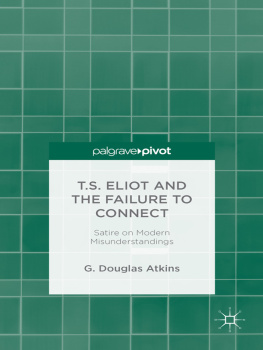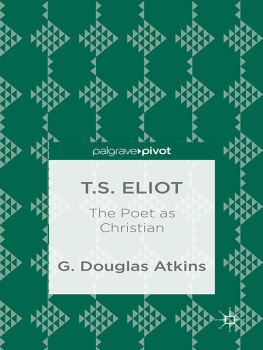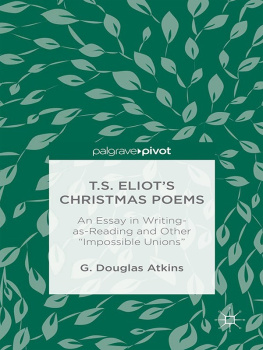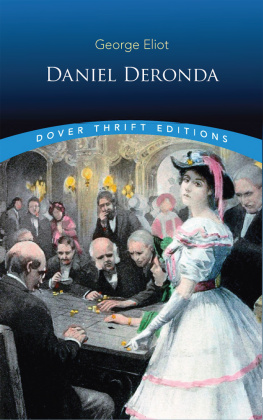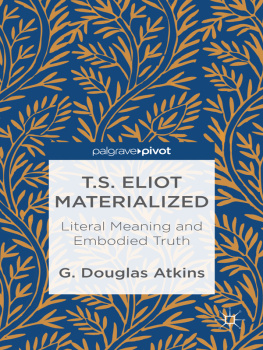T.S. Eliot and the Failure to Connect
Also by G. Douglas Atkins
THE FAITH OF JOHN DRYDEN: Change and Continuity
READING DECONSTRUCTION/DECONSTRUCTIVE READING
WRITING AND READING DIFFERENTLY: Deconstruction and the Teaching of Composition and Literature (co-edited with Michael L. Johnson)
QUESTS OF DIFFERENCE: Reading Popes Poems
SHAKESPEARE AND DECONSTRUCTION (co-edited with David M. Bergeron)
CONTEMPORARY LITERARY THEORY (co-edited with Laura Morrow)
GEOFFREY HARTMAN: Criticism as Answerable Style
ESTRANGING THE FAMILIAR: Toward a Revitalized Critical Writing
TRACING THE ESSAY: Through Experience to Truth
READING ESSAYS: An Invitation
ON THE FAMILIAR ESSAY: Challenging Academic Orthodoxies
LITERARY PATHS TO RELIGIOUS UNDERSTANDING: Essays on Dryden, Pope, Keats, George Eliot, Joyce, T.S. Eliot, and E.B. White
T.S. ELIOT AND THE ESSAY: From The Sacred Wood to Four Quartets
READING T.S. ELIOT: Four Quartets and the Journey toward Understanding
E.B. WHITE: The Essayist as First-Class Writer
T.S. ELIOT MATERIALIZED: Literal Meaning and Embodied Truth
SWIFTS SATIRES ON MODERNISM: Battlegrounds of Reading and Writing
ALEXANDER POPES CATHOLIC VISION: Slave to no sect
T.S. ELIOT, LANCELOT ANDREWES, AND THE WORD: Intersections of Literature and Religion (forthcoming)

T.S. Eliot and the Failure to Connect: Satire and Modern Misunderstandings
G. Douglas Atkins


T.S. ELIOT AND THE FAILURE TO CONNECT
Copyright G. Douglas Atkins, 2013.
All rights reserved.
First published in 2013 by
PALGRAVE MACMILLAN
in the United Statesa division of St. Martins Press LLC,
175 Fifth Avenue, New York, NY 10010.
Where this book is distributed in the UK, Europe and the rest of the world, this is by Palgrave Macmillan, a division of Macmillan Publishers Limited, registered in England, company number 785998, of Houndmills, Basingstoke, Hampshire RG21 6XS.
Palgrave Macmillan is the global academic imprint of the above companies and has companies and representatives throughout the world.
Palgrave and Macmillan are registered trademarks in the United States, the United Kingdom, Europe and other countries.
ISBN: 9781137364708 EPUB
ISBN: 9781137364692 PDF
ISBN: 9781137375742 Hardback
Library of Congress Cataloging-in-Publication Data is available from the Library of Congress.
A catalogue record of the book is available from the British Library.
First edition: 2013
www.palgrave.com/pivot
DOI: 10.1057/9781137364692
Contents
Preface
The new reading I offer of the most famous poem in English of the past century stems from a comparatist approach that is both intra-textual and inter-textual. My focus is thus this popular and influential work, which I read differently from the way it has been read in the past. That difference derives not only from reading it comparatively but also from close attention to verbal details, a meditative point of view, and a sense of the whole of the poets career with the accompanying recognition of the end that is, and is realized by, Four Quartets, Eliots last major poem; there, he writes fromand I read fromthe pattern revealed as Incarnation, the gift half understood. This close attention to verbal details leads, naturally enough, to a renewed recognition of the critical part played by tone in Eliots poetry. Ultimately, then, with The Waste Land as instance, I am proposing a new approach to reading Old Possum (as Eliots friend Ezra Pound called him).
My reading thus has a good deal in common with Eliots own outline of meditative reading in the preface he wrote in 1951 to N. Gangulees anthology Thoughts for Meditation: A Way to Recovery from Within as well as with Paul J. Griffiths recent book Religious Reading: The Place of Reading in the Practice of Religion (1999). It most closely resembles, though, the way of reading-writing that Eliot represents as Lancelot Andrewess in his 1928 essay titled Lancelot Andrewes, even though it ultimately falls short of the acumen and sensitivity there magnificently displayed. Intensely verbal, and often literal, it may seem pedantic to those now unaccustomed to tak[ing] a word and deriv[ing] the world from it; squeezing and squeezing the word until it yields a full juice of meaning which we should never have supposed any word to possess.
This book is, moreover, an exercise in the essayistic criticism that I have been practicing for some time now. Its manner thus differs from the usual scholarly or critical monograph, being more informal and, I hope, inviting. Yet it is not always informal, nor personal or reflective of my own engagement; there is also formal analysis aplenty buttressed and enlightened by scholarship. In various ways, then, this book instances essayistic criticism. As such, it would not mind intervening, if ever so humbly, in the cultural wars as an embodied argument for close reading, responsible writing, and the restoration of the humanities.
While it is also, like all essays, a trial and an attempt, it seeks what may be an impossible union (Four Quartets) of the essay and the ostensible goal of academic commentary. I define that goal as reader-responsibility, which I further understand as the attempt not simply to offer a reading but to express a valid reading that stands as implicit critique of previous misunderstandings. With Eliots poems, I keep trying to get it (down) right, drawn to Prufrock, Gerontion, The Waste Land, The Hollow Men, Ash-Wednesday: Six Poems, and Four Quartets especially, and am met each and every time by words, Eliots and mine alike, that will not stay in place, / Will not stay still. Like prayer as Eliot has taught me to regard it, the poems place mealthough this may well be none of his intention, Old Possumface to face with words difficulty and my own various incapacities as reader and writer. Oh, how you frustrate and humble me, Thomas Stearns Eliot.
Reading I understand as the place where text and reader meet, the timeliness of the latter intersecting with the timelessness of the former. My ideal audience, accordingly, is a composite or compound of the academic and the general, the specialist and the nonspecialist, in short, the attentive and informed reader who has never relinquished her or his amateur status. Therefore, I have kept notes to a minimum; the bibliography contains the secondary materials that I have found particularly useful.
As the reader will immediately be aware, I eschew chronological procedure. The manner being essayistic, I explore, rather than be thesis-bound, and so strict linearity is avoided. I do so for purposes of elucidation, my object in this little book. Indeed, I move toward ending with a penultimate chapter on Gerontion, the major poem (in my judgment) that just precedes The Waste Land in time. Although the book centrally concerns The Waste Land, I open my analyses and comparisons not with it but with another poem, The Hollow Men, a work that follows it rather than precedes it chronologically. Finally, after a chapter on The Waste Land, I turn away from that poem to Four Quartets (only to return to
Next page
